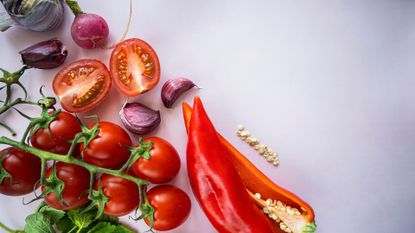Over the past few years, Veganuary has gained momentum. There are plenty of popular diet plans creating a buzz at the moment, with varying degrees of complexity. The idea here is pretty straightforward: you adopt a plant-based, vegan diet for the duration of January. After that, you can go back to your regular diet, or keep it up long-term, or go for something in the middle.
Like any significant shift in eating habits, from intermittent fasting and the keto diet, for example, doing Veganuary is going to cause internal changes. We spoke to Dr Alona Pulde, from global nutrition app Lifesum, to find out what exactly can happen to your body if you go vegan for 31 days.
If you're using this month to adopt a new, healthier regime in 2022, but are feeling your efforts flagging, check out T3's Get Fit for 2022 articles, like these home workout and diet tips.
1. Normalised blood sugar
"High fat and animal food consumption negatively affects the function of insulin," explains Alona. "This increases the risk for insulin resistance, where the body doesn’t respond well to insulin, making it hard for glucose to enter cells. Instead it accumulates in the blood, raising our blood sugar." Over the long term, this process can lead to diabetes. Going plant-based can reverse the situation. "Elevated blood sugars will begin to come down over the first week, and continue to do so over time," she continues.
2. Lower blood pressure and cholesterol
"Diets high in processed high fat foods and animal products have been shown to impair blood flow by causing red blood cells (which carry oxygen) to clump together rather than flow freely," says Alona. That means, in the 4-6 hours following an unhealthy meal, the oxygen delivery to your organs and tissues can be impaired. Going for healthier options, including balanced vegan meals, is a good choice if you want to keep everything flowing smoothly and support your heart health over time. Again, you'll start to see changes over the first week of eating vegan, and they should continue over time.
3. Clearer skin
"Skin health, including acne, redness, and even some signs of ageing improve as inflammation decreases and blood flow increases," says Alona. "Choosing whole plant-based foods is one of the healthiest ways to maximise antioxidant consumption that help maintain healthy skin by fighting harmful free radicals."
4. A boosted immune system
"Research shows that a plant-based diet is beneficial in promoting the development of a more diverse and stable microbiome to better support our digestive system," explains Alona. "In addition, because most of the body’s immune cells live in the gut, having a robust microbiome helps support the optimal health of our immune system."
5. Possible weight loss
If you're above a healthy weight, switching to a vegan diet can help you lose those extra pounds – provided you do it right and keep your meals balanced. "This is due to plant-foods being more calorie dilute and to the high nutrient density, fibre and water content, which helps regulate our hunger signals to appropriately signal satiety so we don’t over-consume," says Alona.











